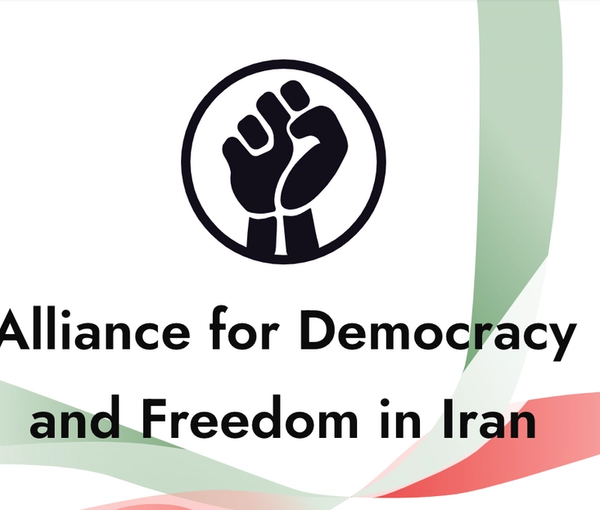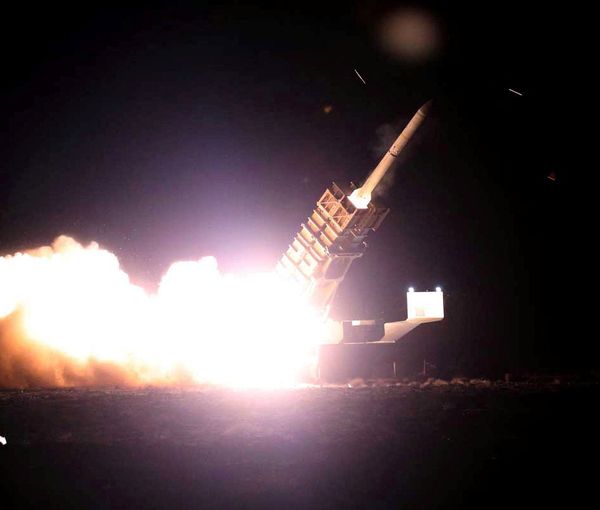Mahsa- Charta der iranischen Exilopposition und China fädelt Saudi- Irandeal ein-Zeichen an Washington?
Breaking News in der Tehran Times:
“By Mehran Shamsuddin
Iran, Saudi Arabia agree to restore diplomatic ties
March 10, 2023 – 15:37
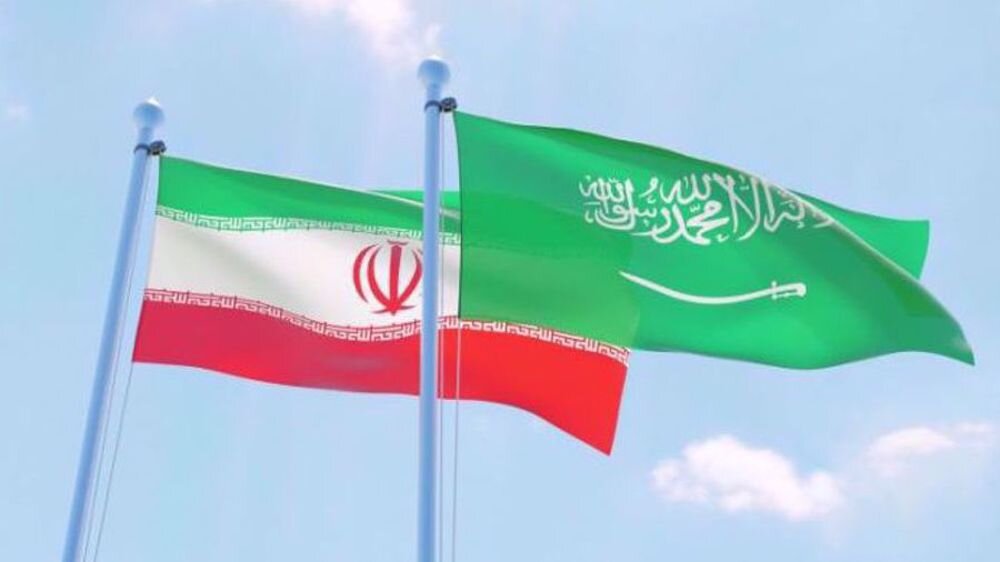
TEHRAN – In a surprise announcement on Friday, Iran and Saudi Arabia announced that they would restore diplomatic ties under a Chinese-brokered deal in a maximum of two months.
The deal was abruptly announced after five days of intensive and secret talks in the Chinese capital Beijing. It was signed by Ali Shamkhani, secretary of Iran’s Supreme National Security Council, Musaad bin Mohammed Al-Aiban, the Saudi National Security Advisor, and Wang Yi, Member of the Political Bureau of the Communist Party of China (CPC) Central Committee and Director of the Foreign Affairs Commission of the CPC Central Committee.
Nour News, a media outlet linked to the Iranian Supreme National Security Council, said hours before the announcement that Shamkhani was conducting “very important negotiations” abroad.
“Admiral Ali Shamkhani, secretary of Iran’s Supreme Security Council, has been busy conducting very important negotiations in a foreign country in recent days,” Nour News said on Twitter. “The imminent announcement of the outcome of these negotiations will result in remarkable developments.”
Shortly after that tweet, official media outlets in Tehran and Riyadh dropped the bombshell by releasing a joint trilateral statement by Iran, Saudi Arabia, and China.
“The three countries announce that an agreement has been reached between the Kingdom of Saudi Arabia and the Islamic Republic of Iran, that includes an agreement to resume diplomatic relations between them and re-open their embassies and missions within a period not exceeding two months, and the agreement includes their affirmation of the respect for the sovereignty of states and the non-interference in internal affairs of states,” the joint statement said.
It added, “They also agreed that the ministers of foreign affairs of both countries shall meet to implement this, arrange for the return of their ambassadors, and discuss means of enhancing bilateral relations.”
The statement further said that Tehran and Riyadh agreed two implement the Security Cooperation Agreement between them, which was signed on 17/4/2001, and the General Agreement for Cooperation in the Fields of Economy, Trade, Investment, Technology, Science, Culture, Sports, and Youth, which was signed on 27/5/1998.
The statement concluded, “The three countries expressed their keenness to exert all efforts towards enhancing regional and international peace and security.”
Saudi Arabia cut diplomatic ties with Iran in 2016 when its embassy was stormed by angry Iranian protestors. Since then, relations between the two countries have been tense. Since April 2021, however, they started talks to patch up their relationship. Five rounds of talks were held in Iraq, with Oman also playing a role in facilitating them.
In the Friday statement, Saudi Arabia and Iran thanked Iraq and Oman for their mediatory efforts.
While Iraq’s mediation was public, China moved ahead with its efforts secretly. Until recently, it was unclear if China played any role in restoring ties between Iran and Saudi Arabia. But the recent visit by Iranian President Ebrahim Raisi to China seems to have greatly contributed to the latest breakthrough.
Mohammad Jamshidi, Deputy Chief of Staff for Political Affairs to the Iranian President, said Friday that the restoration of Iranian-Saudi relations was in part a result of President Raisi’s trip to Beijing.
“Again, Pres. Raisi’s policies succeed. During talks with Pres. Xi in Beijing, constructive ideas for the region were discussed & now they bear fruit. Good neighborly & brotherly policies with Eurasian integration create economic & security benefits free from foreign intervention,” Jamshidi said on Twitter in reaction to the Friday achievement.
Iranian Foreign Minister Hossein Amir Abdollahian also attributed the restoration of ties with Saudi Arabia to the Raisi administration’s Neighborhood Policy, which is meant to improve Iran’s relations with its neighbors.
“The restoration of normal relations between Iran and Saudi Arabia provides great capacities to the two countries, the region, and the Islamic world. The Neighborhood Policy, as the key axis of the thirteenth government’s foreign policy, is moving strongly in the right direction and the diplomatic system is actively looking for more regional steps,” he said on Twitter.”
https://www.tehrantimes.com/news/482710/Iran-Saudi-Arabia-agree-to-restore-diplomatic-ties
China hat Saudi-Arabien und Iran nun zusammengebracht, innerhalb von 2Monaten sollen wieder diplomatische Kontakte und Botschaften eröffnet werden. Dann würde wohl nichts mit saudischen Flugplätzen für einen israelischen Luftschlag gegen Iran. Azerbeidschan hat nun auch erklärt, dass es nicht für einen israelischen Militärschlag zur Verfügung stehe.
“Azerbaijan envoy to Israel: You cannot use our airfields to attack Iran
Azerbaijani Ambassador-Designate to Israel Mukhtar Mammadov denied a report by Haaretz that the country has prepared an airfield to assist Israel.”
https://www.jpost.com/international/article-733935
Netanjahu macht nun die Bennett-Lapid-Regierung sowie Biden für den Saudi-Irandeal verantwortlich,
“Top official blames weakness of Biden, Bennett-Lapid government for Saudi-Iran deal
Official claims talks between Riyadh and Tehran began in 2021 during tenure of short-lived unity coalition when US was working to re-enter nuclear deal; Lapid derides accusation
Bennett und Lapid umgekehrt klagt die neue rechtsradikale Regierung Netanjahus an
“Saudi-Iran deal destroys Israel’s defense wall against Iran, Lapid charges
Former defense minister Benny Gantz said that he believes Netanyahu has abandoned the security of Israel and its citizens.”
https://www.jpost.com/middle-east/article-733960
Während es im Iran zu Massenprotesten kommt, so auch Israel gegen die Justizreform, in der Millionen Israelis das Emde der Demokratie sehen und IDF- Reservisten jetzt schon den Dienst verweigern und sich an den Protesten beteiligen, zudem Chefs von IDF, Mossad und Shinbeth offen Kritik an Netanjahu üben .Interessant in diesem Zusammenhang auch folgende Artikel, der besagt, dass die Saudis von den USA die Genehmigung eines zivilen Atomprogramms erreichen wollten, sowie die Zusage, dass US-Waffengeschafte mit SA nicht nachträglich wieder zurückgezogen werden.
“To normalize with Israel, Saudis want US okay for civil nuclear program — diplomat
Middle East official stresses deal remains ‘far off,’ amid Congressional opposition to boosting defense ties with Riyadh and intensifying Israeli-Palestinian violence”
Offenbar sind saudische Forderungen in Washington auf taube Ohren gestoßen und die Biden-Administration befürchtet, dass die Saudis ein eigenes Atomwaffenprogramm haben könnten, das ein nukleares Wettrüsten im Nahen Osten auslösen könnte, wie es Trump bereits mit dem Iron-Bridge-Programm versuchte, das den Saudis Zugriff auf US-Nukleartechnologie geben wollte, den Iran-Deal fallen liess und IRCG-Oberbefehlshaber Someini beseitigen liess- ohne dass der Iran sich dafür traute zu rächen trotz aller martiaischen Gebärden. Aber die Entfremdung mit Biden zeichnete sich schon ab ,als Biden MBS wegen des Khashogimords und dem Krieg im Yemen kritsisierte und darauf SA zu Putins Freude und Bidens Verärgerung damals im Rahmen der OPEC plus die Erdölförderung nicht erhöhte ,um die Inflation zu senken, ja gar um 2 Millionen Barrel kürzte zu Bidens Verärgerung. Netanjahu droht nun mit einem Militärschlag ,in der Jerusalem Post gar ein Artikel der vor einem nuklearen Holocaust warnt und meint es sei Zeit sich bezüglich des Iran zu entscheiden:
“It’s time for Israel to make a decision about Iran
The would-be Hitlers of Persia have spoken openly about their desire to wipe Israel off the map. In effect, they are seeking to erect an atomic Auschwitz designed to finish what the Nazis began. (…)The writer Michael Freund served as deputy communications director under Prime Minister Benjamin Netanyahu during his first term of office”.
https://www.jpost.com/opinion/article-733874
Und Netanjahu entsprechend:
“Netanyahu: ‘Horrible nuclear war’ will break out, if Iran isn’t stopped
Netanyahu gave an interview to Iran International who intend on dubbing it into Persian and broadcasting it in Iran.
https://www.jpost.com/middle-east/article-733901
Die meisten IDF-Generäle und -Offiziere wissen jedoch, dass keine akute Gefahr eines nuklearen Holocaust aus dem Iran besteht, vielleicht in der Zukunft, sondern dass Bibi dies als Ventil für seine Pläne nehmen will, die Demokratie abzuschaffen, eine autotitäre Herrschaft aufzubauen, die Siedlungen voranzutreiben in „Samaria und Judäa“, sogar eine neue Nakba provozieren, palästinensische Städte wie Huawara wie Sabra, Schatilla oder Lidice auslöschen und die Palästinenser aus dem Westjordanland zu vertreiben, eine jordanische Lösung zu haben, Groß-Israel, die endgültige Auflösung der Zwei-Staaten-Lösung zu bewirken und den Staat Israel nicht durch einen Sturm auf den Capitol Hill und die Knesset zu erobern, sondern aus der Knesset heraus mit seinem faschistischen Smotrich und dem religiösen Fundamentalisten Ben G`vir im iranischen Stil, und dieses Szenario zu nutzen, um die Israelis mittels Feind von außen und nuklearer Holocautsgefahr sich aus Angst um die Fahne zu sammeln. Aber offensichtlich funktioniert das im Moment nicht. Scheinbar nehmen ihm die meisten Israelis diese offensichtliche nukleare Holocaust-Drohung im Moment nicht ab, zumal eben auch nicht breite Teile von IDF, Mossad und Shinbet, die er nun als Linksradikale zu denunzieren sucht.
Doch selbst wenn die Bibi einen Militärschlag gegen den Iran starten will, wird das nicht so einfach. Ex-NATO-General Domroese jr. glaubt, dass ein israelischer Militärschlag ohne die USA logistisch unmöglich wäre. Und im Moment scheint es unwahrscheinlich, dass SA oder Aserbaidschan Israel Flugplätze zur Verfügung stellen, um einen solchen militärischen Luftangriff gegen den Iran durchzuführen.
Aber Ex- NATO- General Domroese jr meint, dass ein israelischer MIlitärschlag logistisch ohne die USA gar nicht möglich sei. Verfahrene Situation. Ob es dazu einem Waffenstillstand und Ende im Yemenkrieg kommt? Einer Entspannung im Irak, Syrien und Libanon? Zur Rückkehr Assads in die Arabische Liga? Diplomatische Wiederaufnahme bedeutet ja auch nicht automatisch Ende aller Konflikte und unterschiedlichen Interessen. Und was macht SA, wenn Iran weiter die Urananreicherung forciert? Oder wird China auch hier noch eine Lösung finden?
China selbst hat eine gewisses Interesse an Sablität im Greater Middle East, da es dieses Gebiet mittels seiner Neuen Seidenstrasse von Zentralasien mttels CSO über Pakistans CPEC und Afgahnistan nun auch mit dem Nahen und Mittleren Osten , eben auch Iran und Saudiarbaien verbinden möchte, desweiteren China eine Krise unegmach kommt, da es die Ölpreise und die Weltwirtschaft negativ beeinflussen kann und es selbst aus Iran und Saudiarabien viel Öl und Gas bezieht, wobei es auch nicht unbedingt eine iranische Atommacht will, aber genauso wie dies im Falle Nordkorea im Ernstfall akzeptieren könnte, da sich der Iran vor alle gegen die USA positioniert. .Beim Iran ist festzustellen, dass zuerst eine gewisse Euphorie in der Tehran Times über den Deal, nun in der heutigen Ausgabe nochmals derselbe Artikel aber etwas relativiert und schon an konkrete Erwartungen geknüpft:“Positive,but with caution“.:
“Positive but with caution March 10, 2023 – 15:37
Iran, Saudi Arabia agree to restore diplomatic ties
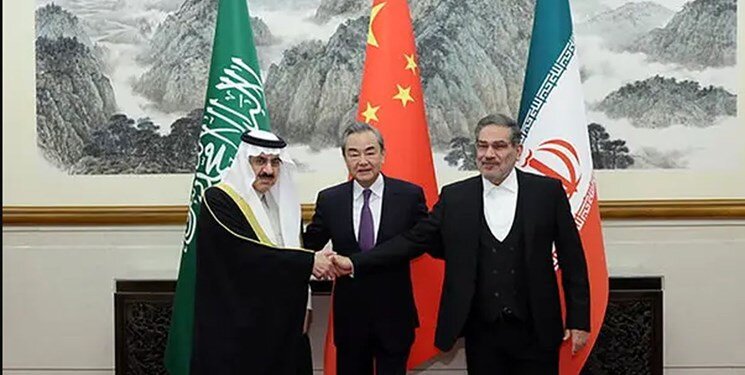
TEHRAN –
(…) Iranian Foreign Minister Hossein Amir Abdollahian also attributed the restoration of ties with Saudi Arabia to the Raisi administration’s Neighborhood Policy, which is meant to improve Iran’s relations with its neighbors.
“The restoration of normal relations between Iran and Saudi Arabia provides great capacities to the two countries, the region, and the Islamic world. The Neighborhood Policy, as the key axis of the thirteenth government’s foreign policy, is moving strongly in the right direction and the diplomatic system is actively looking for more regional steps,” he said on Twitter.
So far, there have been negative reactions from America and Israel towards this agreement, and it seems that they view themselves as the losers in this situation.
However, despite the optimism and hope, caution should be exercised regarding the dimensions and process of this agreement.
The upcoming months and how Riyadh handles issues such as supporting anti-Iran media and the war in Yemen will determine the extent of progress made.“
https://www.tehrantimes.com/news/482710/Positive-but-with-caution
Iran will erst einmal die nächsten Monate abwarten,wie Saudi-Arabien nun konkret auf antiiranische Medienpropaganda reagiert und wie es im Yemen agiert. Dies als zwei Mindestbedingungen. Unterstützt SA die revolutionären Massenproteste im Iran oder nicht, ja sieht da wie im Arabischen Frühling eine Gefahr für seine eigene autoritäre Herrschaft und hilft vielleicht sogar bei deren Unterdrückung jenseits aller sonstigen iranisch-saudischen/schiitisch-sunnitischen Gegensätze? Därngt es die von ihm im Yemen unterstützten Milizen zu einem Waffenstillstand mit den Houthis? Zumidnestens seitens der USA sieht Iran da eine aggressivere neue US- Strategie im Yemen :
“New U.S. strategy in Yemen
By Ali Karbalaei
March 5, 2023 –
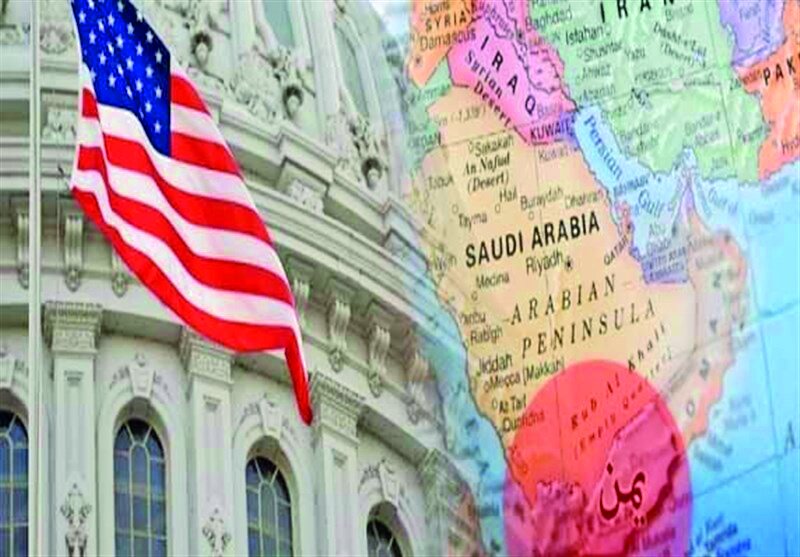
TEHRAN- The United States appears to be pursuing a new policy in Yemen by occupying the country’s natural resources.
This is what the illegal visit of the commander of the U.S. Fifth Fleet and Naval Forces in the U.S. Central Command to the Yemeni governorates of Al-Mahra and Hadhramaut on March 2 strongly suggests.
Yemen has a sufficient amount of oil and natural gas resources for both domestic demand and exports.
And this is something the U.S. and its Western allies are in dire need of getting their hands on amid shortages in the wake of the Ukraine war.
In his latest speech a few days ago, the leader of Yemen’s ruling Ansarallah movement, Abdul-Malik al-Houthi, revealed that Washington had established military bases in the provinces of Hadhramaut and al-Mahra in eastern Yemen.
He added that the commander of the U.S. Fifth Fleet, accompanied by an American diplomat, landed at the headquarters of the illegal U.S.-Saudi military coalition base in al-Mahra.
Vice Admiral Brad Cooper and the U.S. ambassador to the Saudi-led puppet government in southern Aden travelled to the city of al-Ghaydah in Mahra governorate, in a flagrant violation of Yemen’s sovereignty.
According to reports citing well-informed sources, Cooper and the U.S. official Stephen Fagin were accompanied by a delegation of top U.S. military officials at al-Ghaydah airport, which has been turned into a military base for American, British and Israeli forces on the Arabian Sea.
They also held talks with the pro-U.S.-Saudi coalition and self-proclaimed governor Mohammed bin Yasser to discuss “maritime issues”.
Since 2018, the airport has been closed to the people of Mahra and has been occupied by the so-called “Commander of the Coast Guard” with the U.S.-Saudi coalition that has been indiscriminately bombing Yemen since March 2015.
The sources pointed out that the U.S. military visit came after a meeting held by bin Yasser with the U.S. official in the Saudi capital Riyadh last January, in a bid to carry out new missions for the U.S. forces occupying al-Ghaydah airport, under the pretext of “combating smuggling” and “confronting the potential dangers of terrorism.”
The eastern oil-rich Yemeni provinces of Mahra, Hadramout, Shabwa and Marib have recently become the focus of the ambitions of the occupying countries of the U.S., UK and France, with the aim of controlling the sources of oil and gas.
U.S. and European countries intensified their movements in the eastern provinces of Yemen after the escalation of the conflict in Ukraine last year, and have shown great interest in these regions.
The latest developments come as the West faces oil and gas shortages in the wake of its sanctions on the Russian energy sector following the outbreak of the Ukraine war.
Saudi media have confirmed from sources in the U.S. Department of Defense that Washington has retained two CIA military bases in areas under the control of pro-U.S.-Saudi coalition government, including in the city of Mukalla in Hadhramaut governorate.
While the West is claiming that its presence in the region is aimed to deepen bilateral and multilateral maritime cooperation, the evidence on the ground proves quite the opposite.
Yemen considers the presence of foreign forces on its territory as an occupation, and this leads to the question of the reason behind this exceptional concentration of foreign military bases in the country.
Are we are facing a scenario similar to what is happening in northeastern Syria, where U.S. has been plundering the country’s oil to the tune of billions of dollars?
Al-Houthi says the U.S. has been working actively to end the talks between Saudi Arabia and Yemen in Oman intended to end the war.
„The U.S. seeks to obstruct the Omani efforts, which is to distance the coalition from any agreement or understanding, and this is totally unacceptable,“ he said.
Experts say this makes sense as reaching a comprehensive political settlement means an end to the war. And ending the war would require the exit of all foreign forces led by the American and British militaries from the eastern and southern Yemeni coasts. For this reason and other reasons as well, the U.S. and the UK are working to impede the talks and obstruct reaching any political settlement.
Likewise, Yemen’s geographical location is one of the most important in the West Asian region. It has a large front on the Red Sea and has a large gateway to the Gulf of Oman and the Arabian Sea that extends to other regions. The Gulf is what America needs to build military bases and serve its other sinister goals.
The nature of the relations between the western-occupied regions in Yemen, and between Saudi Arabia and the UAE is important as well. The main point here is that the puppet authority in Yemen does not care about the issue of sovereignty.
If the authority put in place by the U.S. and its regional allies had an independent voice, then there would be no occupation, military and naval bases, blockade or plans to seize the country’s natural resources.
If anything, the puppet government is contributing to the violation of Yemen’s territorial integrity and sovereignty.
Analysts have said that the foreign military bases, which have been listed by the leaders of Ansarallah as areas of occupation, will possibly be targeted to create realistic equations.
Others agree that after showing impressive steadfastness in the face of eight years of war, it would be natural for the Yemeni forces to have the ability to target foreign military bases as has been reflected over the years.
With the U.S. putting the brakes on talks in Oman, Sana’a says its military capabilities are growing, and all branches of the armed forces are prepared for the next stage that could open the door to „the option of a broad military operation.“
All of U.S. President Joe Biden’s boasting about ending support for Saudi military operations in Yemen, and the movement in the U.S. Congress that pushed for an end to military aid to Riyadh has now turned out to be inaccurate, and if anything it was just an effort to deflect the growing global condemnation.
What is happening now in al-Mahra and Hadramout is clear evidence of the ongoing interest of the U.S. in not only its military presence but also the expansion of it, one year after the Ukraine war.
Analysts have pointed out that Saudi Arabia has practically taken full control of al-Mahra in cooperation with the U.S. and local militias, and there are many reports citing Israeli naval cooperation as well, in addition to the U.S. cooperation with the two parties.
Will Yemen turn into Syria? Time will tell.
But judging by the past few years, Yemeni forces have proved capable of confronting threats and turning their chants and slogans into extraordinary retaliatory operations.
“The level of our military capabilities has evolved compared to the beginning of the aggression” al-Houthi warned.
„If we look at the situation today compared to the beginning of the aggression, and to previous years, there is a major difference in the level of Yemeni military capabilities,“ the leader of the Ansarallah movement explained.
https://www.tehrantimes.com/news/482623/New-U-S-strategy-in-Yemen
Wird also Saudarabien sich den USA anschliessen im Yemen oder eher auf die angebliche Neue Nachbarschaftspolitik Irans eingehen, die etwas Davotoglus No Problem- Politik ähnelt, bevor Erdogan sie kippte. Iran und Saudiarabien haben vorerst gesehen, dass sie sich beiderseits mittels ihrer offenen Konfrontation gegenseitig geschwächt und geschädigt haben. Iran will erst einmal abwarten, wie Saudi-Arabien nun konkret auf antiiranische Medienpropaganda reagiert und wie es im Yemen agiert. Dies als zwei Mindestbedingungen. Unterstützt SA die revolutionären Massenproteste im Iran oder nicht, ja sieht da wie im Arabischen Frühling eine Gefahr für seine eigene autoritäre Herrschaft und hilft vielleicht sogar bei deren Unterdrückung jenseits aller sonstigen iranisch-saudischen/schiitisch-sunnitischen Gegensätze?
Zuerst einmal gibt es in der Exiloppsoition eine neue Entwicklung: Die Mahsa- Charta oder wie Iran Interational berichtet:
The logo of the Alliance for Democracy and Freedom in Iran
Iran’s United Opposition Figures Release Mahsa Charter
19 hours ago4 minutes
Author: Iran International Newsroom
Prominent Iranian dissident figures, who have recently made an alliance against the Islamic Republic, has issued a Charter of Solidarity and Alliance for Freedom.
The group, which calls itself the Alliance for Democracy and Freedom in Iran, announced its existence in a February event at Georgetown University’s Institute for Women, Peace and Security (GIWPS) — titled ‘The Future of Iran’s Democracy Movement.‘
Exiled Prince Reza Pahlavi, Nobel peace prize laureate Shirin Ebadi and Canada-based activist Hamed Esmaeilion, as well as US-based author, journalist and women’s rights activist Masih Alinejad, actress and activist Nazanin Boniadi and Secretary General of Komala Iranian Kurdish party Abdullah Mohtadi had said that they would release the charter that would lay the foundations for political representation of the aspirations of protesters in Iran and gain support for isolating the Islamic Republic.
The document is also called the Mahsa Charter in reference to “the murder of Mahsa (Jina) Amini and the beginning of the Woman, Life, Freedom revolution,” which has seen the people of Iran continuing to fight for freedom “to break the chains of injustice, discrimination and tyranny.”
Emphasizing that the way to building a free and democratic Iran is to overcome the Islamic Republic regime, they said, “Reaching this ultimate goal necessitates the three elements of unison, organization and relentless continuity in activism.”
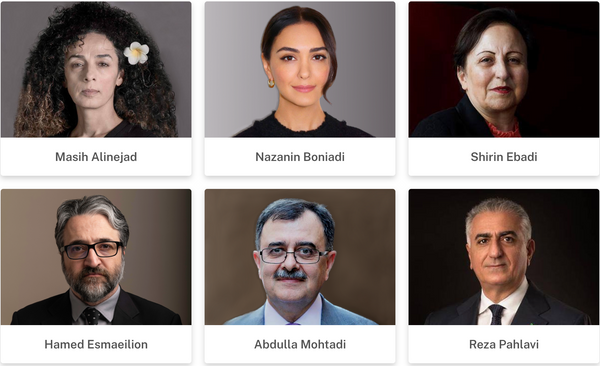
They said the charter relies initially on activities outside of the country, underlining that the isolation of the Islamic government internationally is a first and necessary step for a democratic change.
The charter calls for international pressure on the Islamic Republic to halt all death sentences and to immediately release all political prisoners without condition; expulsion of the regime’s ambassadors and all its dependents by democratic governments and acknowledging the alliance of opposition figures as well as their charter; and facilitating any means necessary to aid the people of Iran.
“Subsequent actions will take place with the participation of activists inside Iran to focus on fair transitional justice, the formation of a council for the transition of power, and the means by which power is transferred to a secular, democratic government,” reads the charter, adding that “The Alliance will introduce actionable initiatives using democratic methods to be implemented at the earliest opportunity in order to bring to fruition the civil action struggles of the people of Iran.”
The members of the alliance have repeatedly said that anyone who accepts the core values of the group is welcome to join them, but until now there had not been a clear explanation for their main values. They enumerated 17 common values for a democratic Iran, noting that the form of the future government will be a secular-democratic system determined through a referendum. “All political and official members of the state shall be elected through a free and democratic election process whereby citizens of all beliefs, ethnicities, gender and sexual orientation be afforded dignity and equal rights before the law.”
The need to maintain the territorial integrity of Iran while accepting diversity in language, ethnicity, religion and culture; and to decentralize power by deferring financial, bureaucratic and policy making affairs to elected provincial, city, and regional administrations is also among the values.
The charter also talks about the formation of an independent organization to supervise elections and the acceptance of domestic and international monitoring of elections, which would result in “a new national constitution through an inclusive and transparent process.” “The new constitution shall adhere to the Universal Declaration of Human Rights in its entirety.”
The charter also mentions the abolition of the death penalty and any corporal punishment and enacting the Convention on the Elimination of All Forms of Discrimination against Women as well as the establishment of an independent judicial system in accordance with international standards. It calls for Justice for all victims of the Islamic Republic through fact finding commissions under the auspices of fair and independent courts including the right to independent legal representation.
One of main points of the charter is the abolition of the Islamic Revolutionary Guards Corp – or the IRGC — and all of its subsidiaries. “The possibility to integrate IRGC elements into other armed forces such as the army may only be possible in the absence of involvement in crimes and based on necessary qualifications,” it said, adding that “The military shall only be responsible to defend the territorial integrity of the country.”
It also called for “cooperation and peaceful relations with all countries in the world, and to cease all interference in the affairs of other countries, and to join the International Criminal Court.” Joining the International Convention on Nuclear Safety and the Financial Action Task Force (FATF) were key values in the charter.
“To overcome the Islamic Republic’s tyranny, all Iranians who are committed to freedom must unite. The courage of the people of Iran and their persistent fight for freedom shall be the bright beacon of hope for our future. Let us stand united in the creation of a free tomorrow,“ the charter concluded.
Wohlgemerkt versteht sich die Aliance for Democracy and Freedom in Iran nicht als Exil- oder als Schattenregierung oder wie sie selbst schreibt:
„Alliance for Democracy and Freedom in Iran (ADFI) is an alliance of individuals, organizations, political parties and other entities who are committed to the “Mahsa” Charter as a framework for cooperation. The alliance pursues the non-violent overthrow of the Islamic Republic regime and establishment of a secular democracy that serves the will of all Iranian citizens.
What is our purpose?
We aspire to build the foundations of a secular democracy upon which political parties and civil society can be elected by, and serve the will of the people. This process is our common goal to ensure prosperity, freedom, equality and the well being for every Iranian citizen.
Our mission
The ADFI is not a shadow government. We are not the leaders of the Iranian people, but we seek to reflect and pursue their demands. We shall continue this endeavor for as long as our people and our homeland suffer under tyranny and oppression, with the aim of establishing a secular and democratic structure in Iran.“
The Charter of Solidarity and Alliance for Freedom (The Mahsa Charter)
Last updated on March 9, 2023
After the murder of Mahsa (Jina) Amini and the beginning of the Woman, Life, Freedom revolution, the people of Iran continue to fight for freedom and intend to break the chains of injustice, discrimination and tyranny. All of us who bear the scars of the Islamic Republic’s atrocities on our bodies and souls, believe that the way to building a free and democratic Iran is to overcome the Islamic Republic regime. Reaching this ultimate goal necessitates the three elements of unison, organization and relentless continuity in activism.
This charter relies initially on activities outside of the country as a means to facilitate the participation of activists inside the country. We believe that the isolation of the Islamic government internationally, is a first and necessary step to affect democratic change on which basis the following objectives shall be pursued;
- To impose international pressure on the Islamic Republic to halt all death sentences and to immediately release all political prisoners without condition.
- Consultation with democratic governments to expel the ambassadors of the Islamic Republic.
- Consultation with democratic governments to expel all dependents of the Islamic Republic from their respective countries.
- Consultation with democratic governments to support this charter and this Alliance.
- To facilitate any means necessary to aid the people of Iran.
The involvement of these governments shall preclude any interference in the internal affairs, and the will of the people of Iran.
Subsequent actions will take place with the participation of activists inside Iran to focus on fair transitional justice, the formation of a council for the transition of power, and the means by which power is transferred to a secular, democratic government. This agenda requires the participation of all citizens specializing in various fields who will be invited to join committees dedicated to transitioning from the Islamic Republic. The Alliance will introduce actionable initiatives using democratic methods to be implemented at the earliest opportunity in order to bring to fruition, the civil action struggles of the people of Iran.
Common values of the Alliance for changing the Islamic Republic regime to a democratic Iran:
DEMOCRATIC GOVERNANCE
- To determine the form of government by way of a referendum, to establish a secular-democratic system (based on the principle of separation of religion from government) in which all political and official members of the state shall be elected through a free and democratic election process whereby citizens of all beliefs, ethnicities, gender and sexual orientation be afforded dignity and equal rights before the law.
- To maintain the territorial integrity of Iran while accepting diversity in language, ethnicity, religion and culture.
- Decentralization of power by deferring financial, bureaucratic and policy making affairs to elected provincial, city, and regional administrations.
- To establish an independent organization to supervise elections and the acceptance of domestic and international oversight organizations to monitor elections.
- To hold democratic elections to form a Constituent Assembly and to produce a new national constitution through an inclusive and transparent process.
HUMAN RIGHTS AND HUMAN DIGNITY
- Acceptance of and respect for diversity and variety in Iranian society and efforts to remedy historic and current discrimination. To accept the position of native languages based on international Laws and Conventions.
- The new constitution shall adhere to the Universal Declaration of Human Rights in its entirety, and all of the rights and freedoms noted therein.
- To abolish the death penalty and any corporal punishment; banning any and all arbitrary arrests and detentions during the transition, and to join the United Nations Convention Against Torture (UNCAT).
- To join and enact the Convention on the Elimination of All Forms of Discrimination against Women, The Convention on the Rights of Persons with Disabilities (CRPD), and to implement all provisions of the Convention on the Rights of the Child and all other conventions to which Iran is a signatory, but has failed to adhere to, and the adoption of the International Covenant on Civil and Political Rights (ICCPR).
- To join and adopt the International Labour Organization’s conventions on the rights of workers including freedom to assembly and to form organizations, the right to strike and collective bargaining agreements. To ensure the health, security and non-discrimination policies and fair minimum wage guarantees.
JUSTICE
- To support the establishment of an independent judicial system in accordance with international standards.
- Justice for all victims of the Islamic Republic through fact finding commissions under the auspices of fair and independent courts including the right to chosen, independent legal representation.
PEACE AND SECURITY
- The Abolition of the Islamic Revolutionary Guards Corp. and all of its subsidiaries. The possibility to integrate IRGC forces into other armed forces such as the army may only be possible in the absence of involvement in crimes and based on necessary qualifications. The military shall only be responsible to defend the territorial integrity of the country.
- To establish policies of cooperation and peaceful relations with all countries in the world, and to cease all interference in the affairs of other countries, and to join the International Criminal Court. To initiate legal action within the framework of international law to annul any and all unfair treaties that are not in the national interest of Iran that have been entered into with other nations or companies by the Islamic Republic government.
- To join and enact the International Convention on Nuclear Safety.
ENVIRONMENTAL SUSTAINABILITY
- Full compliance with the principles of sustainability and protection of the environment and to join relevant United Nations conventions.
ECONOMIC TRANSPARENCY AND PROSPERITY
- To abolish all economic monopolies and to adhere to international banking and currency exchange standards, and also to facilitate international trade and investment opportunities. To focus on remedial policies and special economic provisions to empower marginalized provinces and regions. Transparency, actionable anti-corruption measures and to join the Financial Action Task Force (FATF).
To overcome the Islamic Republic’s tyranny, all Iranians who are committed to freedom must unite. The courage of the people of Iran and their persistent fight for freedom shall be the bright beacon of hope for our future. Let us stand united in the creation of a free tomorrow.
https://adfiran.com/en/docs/mahsa-charter
Im Vorfeld kam es aber innerhalb der Exilopposition zu ziemlichen Auseinandnersetzungen, das Anhänger des Schahsohns einen Führungsanspruch reklamierten, gegen Minderheiten hetzten, die alte Schahdiktatur und Monarchie wieder hergestellt werden sehen wollte und nicht jur eine konstitutionelle Monarchie oder gar liberale Demokratie und zumal eher spalterisch wirkten und auch mit altbewährten Savak-Methoden gegen andere Oppositionelle der Linken und Demokraten vorgingen
„Mittwoch, 22.02.2023 / 12:38 Uhr
Iranische Opposition: Besorgniserregende Entwicklungen
Gastbeitrag von Kazem Moussavi
Anhänger des Schah-Regimes versuchen, Demonstrationen der iranischen Opposition für sich zu vereinnahmen.
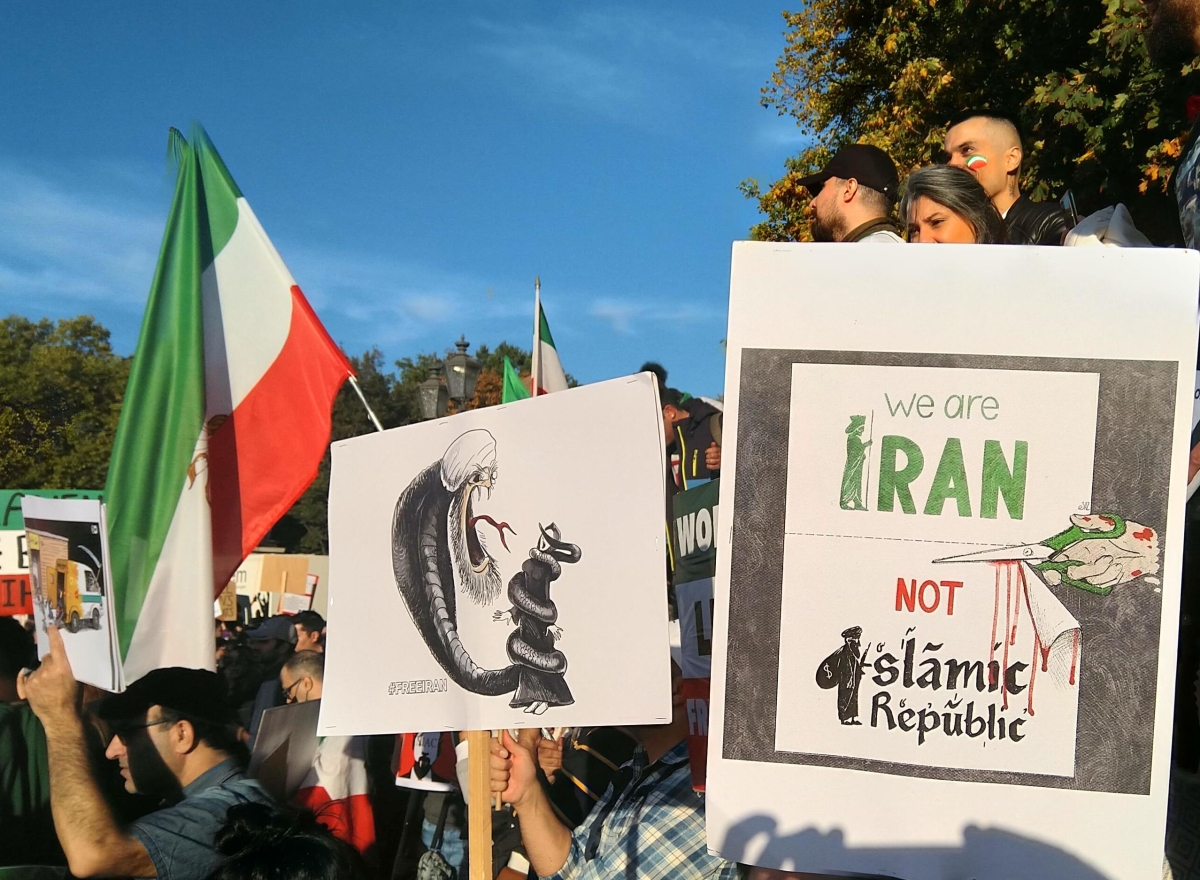
Anti-Regime Protest in Berlin, Bild: Thomas v. der Osten-Sacken
Es wurde berichtet und dokumentiert, dass einige fanatische Anhänger Reza Pahlavis, die extreme Befürworter einer Restaurierung der früheren Monarchie im Iran sind, bei Demonstrationen gegen das Regime in Brüssel, London, Hamburg, Düsseldorf und in den USA Teilnehmer:innen, die sich dort mit Transparenten und Parolen gegen ein diktatorisches Schah-System im Iran aussprachen, angegriffen und teilweise verletzt haben.
Dem iranischen Republikaner H. H. wurde am 20.2.2023 in Brüssel von einem Ordner und Pahlavi-Anhängern gegen den Kopf getreten.

Er liegt laut Protokoll mit Schädelprellung und leichter Gehirnerschütterung immer noch im Krankenhaus (21.2.2023). H.H. rief in Anlehnung der Parole der Studentenproteste im Iran: „Tod den Unterdrückern – sei es der Shah oder der Oberste Führer!“. Auf diversen Demonstrationen der Pahlavi-Anhänger wurden folgende Parolen skandiert: „Tod den Dreien: Linke-Mullahs-Mojahed!“, eine Parole, die auch Pahlavis Ehefrau auf ihrer Instagram-Story postete, außerdem: „Unser Anführer ist Pahlavi, jeder, der das nicht sagt, ist eine Alie (d.h. kein Iraner)!“, „Mann, Heimatland, hoch lebe der Shah (Javid Shah)!“.
Sie propagieren, dass „Javid Shah“ nicht nur ein Slogan sei, sondern „unser Weg zum Sieg“, vgl. Kayhan London. Kürzlich wurden auf einer Demonstration in Los Angeles und auf weiteren in Brüssel und München (während der Münchner Sicherheitskonferenz 2023) neben Bildern von Reza Pahlavi auch Plakate, auf denen Parviz Sabeti zu sehen war, gezeigt. Auf dem Bild Sabetis stand auf Persisch: „Der Albtraum künftiger Terroristen!“. Parviz Sabeti war in der Schah-Zeit ein hochrangiger Verantwortlicher des berüchtigten Nachrichtendienstes SAVAK, der so genannten „Organisation zur Information und zum Schutz des Landes“.
Sabeti war Leiter der Hauptabteilung III (Inlandsaufklärung) und in dieser Funktion für Verhaftungen, Folter und Hinrichtungen von Schah-kritischen Student:innen und Mitgliedern der Fedain- und Mujahedin-Organisationen mitverantwortlich. Parviz Sabeti, der seit der islamistischen Revolution 1979 in den USA lebt, nahm vor zwei Wochen an einer Pro-Pahlavi Demonstration in LA teil, auf der Reza Pahlavi, Massih Alinejad und weitere Verbündete sprachen. Reza Pahlavi respektive seine Anhänger werben dafür, dass die Integrität des Iran keine Bedingung sei, „sondern das Prinzip!“.
Somit wird im multinationalen Staat Iran nach dem Sturz der Mullahs direkt oder indirekt in Teheran die zentralistische Hegemonie der persischen Kultur angestrebt, während demgegenüber die aktuelle Revolution für „Frau Leben Freiheit“ in einem künftig demokratischen freien Iran nicht auf die populistische und nationalistische Parole der Pahlavi-Anhänger wie „Alle gemeinsam für die Einheit des Iran“، sondern konkret auf Pluralismus, Gleichberechtigung und Menschenrechte der sexuellen, religiösen und ethnischen Minderheiten im Land fokussiert ist.
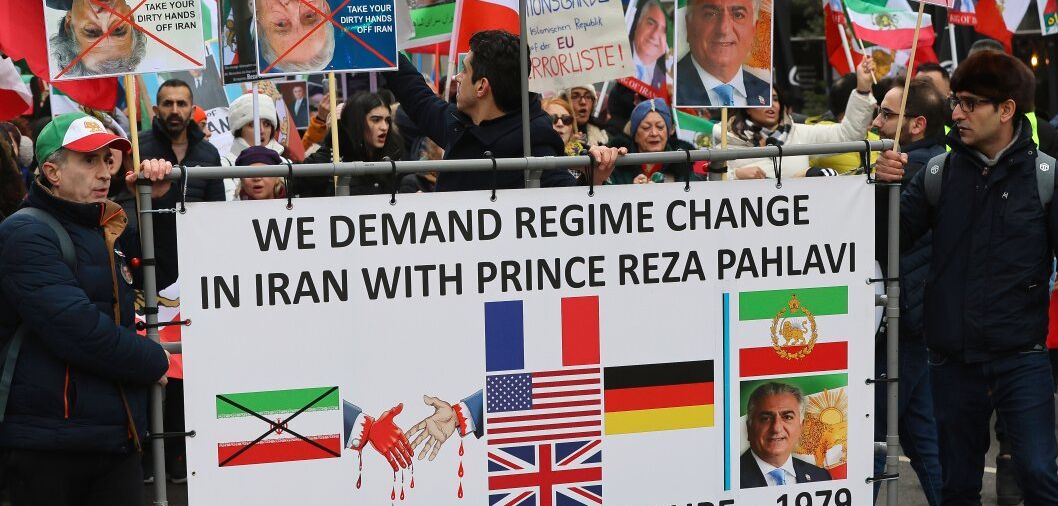
Unter den Monarchisten ist überdies die Entwicklung einer nationalistischen ideologischen Strömung, der sogenannte „Pahlavismus“, zu beobachten. Diese Gruppe, die ihre Thesen im Magazin „Fereydoun“ publiziert, hat jüngst in den USA eine Partei namens „Die Iran-Novin-Partei“ oder „Partei Neuer Iran“ gegründet, in Anlehnung an eine Partei, die 1963 im Kaiserreich Persien, von Hassan Ali Mansur und seinen Freunden als die Partei „Neuer Iran“ (Iran Novin) ins Leben gerufen worden war. „Hassan Ali Mansur war von 1964 bis 1965 Premierminister des Iran. Er übernahm sein Amt zur Zeit der Weißen Revolution Mohammad Reza Schahs“,
Reza Pahlavi, Massih Alinejad und Nazanin Bonjadi wurden als „neu formierte Oppositionsvertreter:innen“ inoffiziell zur Münchner Sicherheitskonferenz (MSC) 2023 eingeladen. Ihre Teilnahme an der MSC wurde von den persischsprachigen Pahlavi-unterstützenden Sendern IraninternationalTV, Manoto, Voice of America, RadioFarda sowie der Deutschen Welle Persisch und den Medien des Springer-Verlags in Deutschland massiv propagiert. Bild titelte: „Persiens letzter Prinz will die Mullahs stürzen“ und die „Welt“ schrieb über ein Interview mit Reza Pahlavi: „So plant die Exil-Opposition einen Neuanfang im Iran“.
Es sieht so aus, als ob nunmehr die Frauenopposition im Iran, die sich voll auf die Abschaffung des Genderapartheid-Regimes im Land konzentriert hat, unsichtbar gemacht und geschwächt wird, während aus Appeasement-Kreisen im Ausland eine kultartige, persisch nationalistische „Opposition“ lanciert und unterstützt wird. Obwohl bei den Protesten im Iran nicht zu Gunsten bestimmter Politiker und Organisationen im Land und im Exil aufgerufen wird. Diese besorgniserregende politische Entwicklung durch die Pahlavi-Anhänger, die die Antiregime-Proteste für sich reklamieren, hat es in kürzester Zeit geschafft, unter den früher gemeinsam protestierenden Regimegegnern und Oppositionellen im Exil offensichtlich eine Spaltung herbeizuführen.
Davon profitieren hauptsächlich die Geheimdienste des Terror-Regimes im Ausland, indem sie begünstigt werden, die Unterstützung der Proteste aus der Diaspora zu schwächen, um diese im Iran durch das Regime niederzuschlagen und sich an der Macht zu halten.“
Nun scheint sich der Schahsohn vorerst wieder in die Opposition eingereiht zu haben und mittels der Mahsa- Charta nun eie gewisse Einigkeit herzustellen. Die Mullahs werden nun sehen inwieweit die Mahsa- Charta nun auch von der iranischen Opposition im Ira und nicht nur im Exil angenommen wird du wie Saudiarabien sich dazu stellen wird, finanzielle, medial und diplomatisch.
Derweil versucht der Iran seine alte F 15- Flotte durch russische Flugzeuge zu ersetzen, sowie die militärische Kooperation mit Russland über Drohnenlieferungen hinaus zu vertiefen:
“Iran finalizes deal to buy Russian Su-35 fighter jets
March 10, 2023
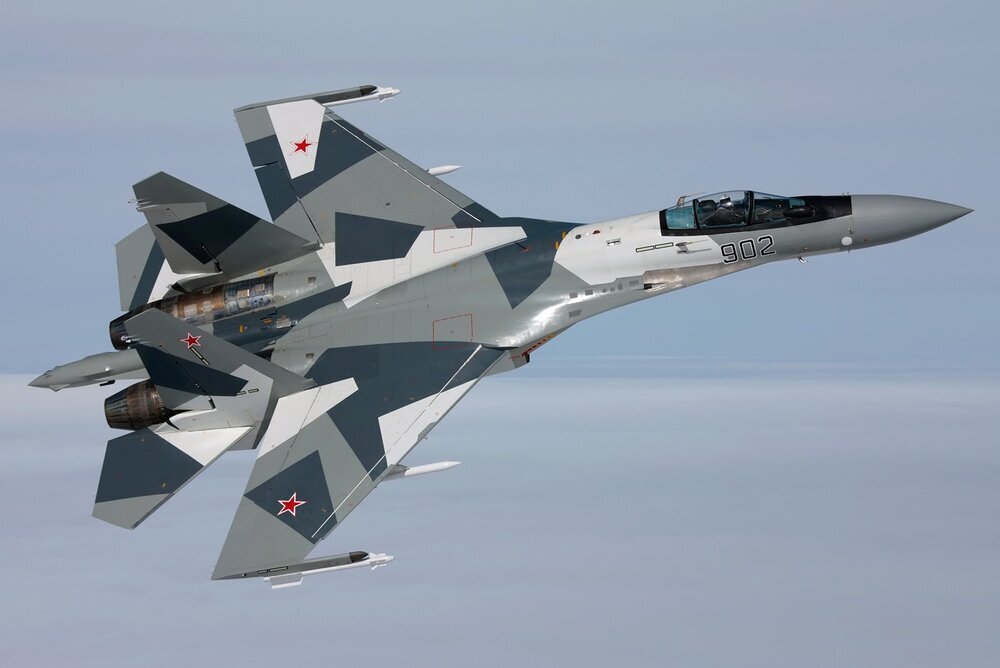
TEHRAN – Iran has finalized a deal with Russia to purchase Russian Sukhoi Su-35 fighter jets, a Russian state-run news outlet reported.
The Russian Sputnik news agency said the information related to the delivery date and the number of the fighters is kept under wraps.
Citing Iran’s mission to the UN in New York, Sputnik said after the end of the Iran-Iraq war in 1988, Iran offered a group of countries its willingness to buy combat aircraft, and Russia said it was ready to sell.
“The mission added that the Su-35 combat aircraft are technically acceptable to Iran, so after October 2020, and the end of Iranian restrictions on purchases of conventional weapons (UN Resolution No. 2231), Iran completed the procedures for its purchase,” the Russian news agency noted.
The Iranian mission to the United Nations did not specify exactly when the deal was completed or how many aircraft Iran would receive from Russia, according to Sputnik, saying, “No details will be published because they are confidential.”
Earlier, the Russian ambassador to Iran, Alexei Dedov, told Sputnik that Moscow and Tehran are working on formulating a new agreement within the framework of Russian-Iranian relations, pointing out that it will be of strategic importance.
The ambassador also noted that it is important for it to be solid and balanced, and to reflect the new realities of bilateral cooperation. „
https://www.tehrantimes.com/news/482751/Iran-finalizes-deal-to-buy-Russian-Su-35-fighter-jets
Desweiteren vermeldet Teheran, dass es nun neben seinem schwarzen Gold, nun auch weißes Gold gefunden habe, eine der größten Lithiumvorräte nach Bolivien, Chile und Argentinien:
“Huge “white gold” discovery draws spotlight on Iran’s mining industry
March 11, 2023
By Ebrahim Fallahi
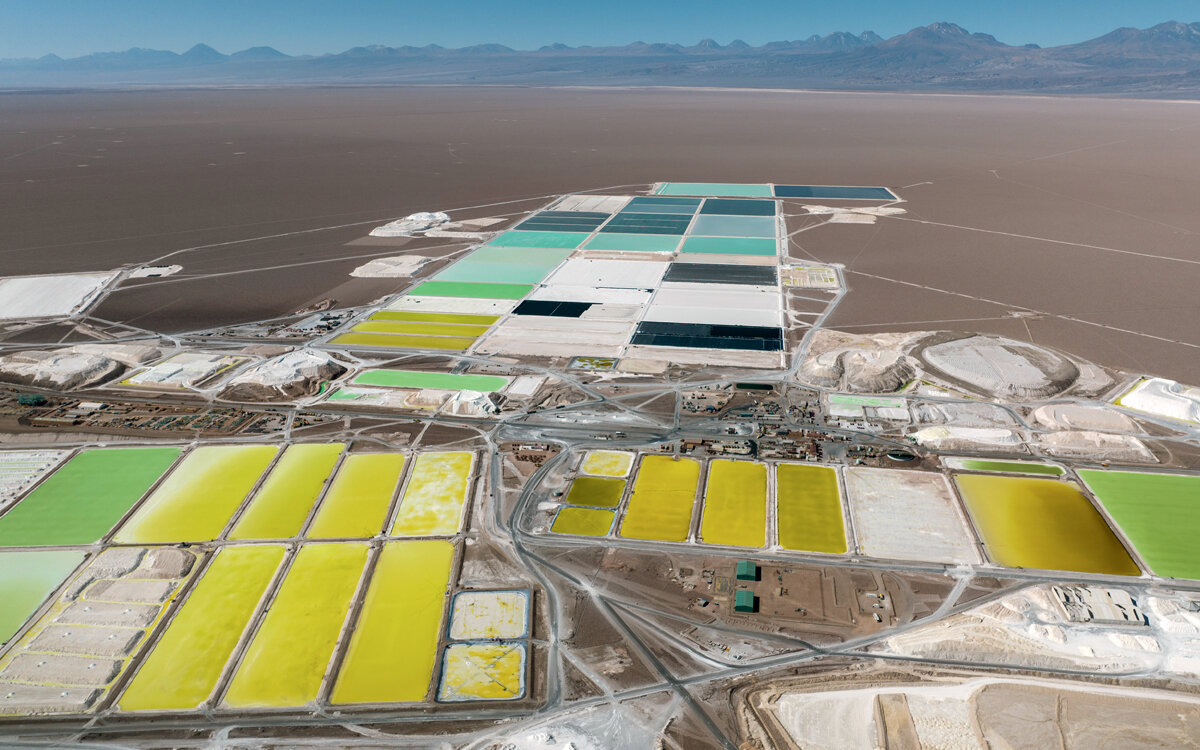
TEHRAN – In late February, Iranian Industry, Mining, and Trade Ministry announced the discovery of one of the largest lithium reserves in the world, an achievement that has put the Islamic Republic’s mining sector on the map of the global mining industry.
According to Iran’s industry officials, the lithium reserve, discovered in western Hamedan Province, holds up to 8.5 million tons of the element, and considering the world’s current discovered lithium reserves, Iran could hold up to 10 percent of the total global reserves.
The U.S. Geological Survey, which maps raw materials deposits across the planet, estimated the world’s total lithium reserves to stand at roughly 89 million tons.
Considering the estimation of the Geological Survey and Mineral Explorations of Iran (GSI), the reserve discovered in the country could be one of the largest lithium ore discoveries in the world and could hugely support Iran’s manufacturing sector and boost its exports.
The White Gold
Lithium, or as the scientists call it the ‘white gold’, is a critical metal for the continent’s ecological transition due to its key role in making batteries for electric vehicles and devices; in other words, lithium is considered one of the most significant elements in the global push for net zero by 2050.
Surging demand for electric vehicles saw lithium prices “skyrocket” by around 550 percent in 2021. The prices rose to as much as $86,170 a ton in November 2022, but have since come down to about $52,000 a ton. Experts believe that the value of the lithium-ion battery market is going to grow to $193.13 billion by 2028, therefore many countries have made it their strategic aim to secure supply.
Iran to extract lithium by 2025
After the discovery of the reserves, the next step for Iran would be to make the necessary preparations for the extraction and processing of the mineral.
Although the Iranian mining industry is considerably advanced and the country is currently mining over 80 different types of minerals, the Islamic Republic could also use the experiences of other countries, especially its big trade partner China for extracting and processing the new mineral.
China has vast experience in extracting lithium since the country has been mining the product in Latin America for several years.
Last week, Mohammad-Hadi Ahmadi, the deputy head of the Ministry of Industry, Mining, and Trade Department in Hamedan, said the country will be able to extract lithium from two newly-discovered lithium deposits in the next two years.
According to Ahmadi, the deposits cover an area of around 11 square kilometers in Qahavand Plain, located more than 50 kilometers to the east of the provincial capital of Hamedan.
He said the discovery of the deposits had taken nearly four years, adding that the Ministry of Industry, Mining, and Trade is currently studying technological capacities existing in two developed countries as part of efforts to start up the mines through a partnership with private investors.
The ministry’s authorities expect more lithium ore deposits could be discovered in Hamedan, a province with vast deposits of clay which is a source of lithium.
Implications for Iran
According to the U.S. Geological Survey, Bolivia, Argentina, and Chile currently have the largest overall lithium reserves in the world and Iran’s 8.5-million-ton lithium deposit would make this newly discovered reserves the fourth-largest in the world.
The discovered lithium reserves can become a new source of revenue for the Iranian government which has been following new strategies to distance the economy from oil.
Detailed studies need to be conducted to determine the exact value of the discovered reserves and the feasibility of extraction; however, the potential economic benefits could be of great importance and a boost to the country’s economy.“
https://www.tehrantimes.com/news/482759/Huge-white-gold-discovery-draws-spotlight-on-Iran-s-mining
Nun, gut, es bleibt abzuwarten, wie sich nun der SA-Iran-Deal konkret auswirken wird und ob Saudiarabien damit wirklich schon die Lager gewechselt hat, wie einige unken. Die Frage, ob Unterstützt SA die revolutionären Massenproteste im Iran unterstützen wird oder nicht, da es in ihnen wie im Arabischen Frühling eine Gefahr für seine eigene autoritäre Herrschaft sieht und hilft vielleicht sogar bei deren Unterdrückung jenseits aller sonstigen iranisch-saudischen/schiitisch-sunnitischen Gegensätze, kommentiert Thomas von der Osten- Sacken derfolgt:
„Letzteres ist eher unwahrscheinlich und ja, erst mal abwarten, was dieser Deal genau bringt. Bis 2016 gab es ja auch diplomatische Beziehungen. Ich denke von den Saudis ist das eher ein Zeichen Richtung Washington. Bin Salman hasst die Biden Adminstration“.
Heute ist der von China gebrokerte SA-Irandeal auch in der Tehran Times unter der Überschrift: WHO won,WHO lost?
https://www.tehrantimes.com/news/482793/Who-won-who-lost
Mehr eine rhetorische Frage. Alle haben gewonnen außer den USA und Israel, der EU wird noch anheimgestellt sich zu entscheiden, vor allem Israel dem zudem der baldige Kollaps aufgrund seiner eigenen innenpolitischen Polarisierung und Dysfunktionalitit der einzigen liberalen Demokratie im Nahen Osten unter die Nase gerieben wird..Zudem sei dies eine Zeitenwende, da nun Asien inklusive Westasien erstmals selbst aktiv geworden seien un das Zeitlater als die USA Hauptakteur im Greater Middle East/Westasien gewesen sei, nun endgültig vorbei sei
https://www.tehrantimes.com/news/482793/Who-won-who-lost
Zumindestens scheint der Deal wieder die im Sturzflug begriffene iranische Währung etwas zu stablisieren:
“Restoration Of Ties With Saudi Boosts Iran’s Currency
https://www.iranintl.com/en/202303119655
Der Global Times ist es vor allem wichtig, den chinesischen Ukrainefriedensplan und nun den SA-Irandeal als Elemente und praktische Anwendung ihrer Global Security Initiative (GSI) neben seiner gleichzeitigen Global Development Initiative (GDI) zu propagieren ,die im März noch offiziell auf dem Boao-Forum vorgestellt wird: China als harmonischer win-win-win-Weltfriedensbringer statt Weltpolizist un global troublemaker USA
“China’s mediation in Saudi-Iran deal to restore ties best practice of GSI, exerting far-reaching influence on other hotspot issues: experts”
https://www.globaltimes.cn/page/202303/1287105.shtml
Bereitet nun Israel mit den USA einen Militärschlag vor. Dafür scheint nun flgende Nachricht in der Times of Israel zu sprechen:
“IAF fighter jets, refuelers hold air drill with US forces, thought to focus on Iran
Two-week exercises simulate ‘strategic strike’ in unfamiliar enemy territory with ‘abundance of anti-aircraft defenses’”
Global Review hat auch mal Ex-NATOgeneral Domroese jr.befragt. Er meinte, dass das Routinemanöver seien, die nichts weiteres bedeuten und nur eine Drogkulisse für mehr Diplomatie aufbauen sollten. Aber die Lage hat sich wohl mit der Forcierung der Anreicherung ,israelischen Drucks und der Instabilität des Irans geändert. Zudem es nun das dritte Manöver ist, bei dem die USA Auftankflugzeuge im Gegensatz zu früheren US-israelischen Manövern gestellt hatten, also ihre eventuelle logistische Unterstützung für einen Militärschlag symbolisieren wollten. Domroese meinte, dass seizwar richtig, aber es fehlen am politischen Willen und man hoffe irgendwie immer noch auf Diplomatie. Zumal: Die Reaktion der Republikaner im Kongress, die scheinbar nicht mehr an eine Verhinderung einer Atommacht Iran glauben, bestenfalls nun auf Containment umsatteln, ist möglicherweise ein Hinweis, dass es bei den noch softeren Demojraten und Biden noch weniger zu erwarten ist, dass sie einen Militärschlag unterstützen.
Bezeichnend ist nun auch ,dass etwa der fanatischste Iranhawk der Republikaner neben Bolton und Dainel Pipes Lindsey Graham gar nichts zum Iran sagt, sondern nun angesichts der Ermordung zweier amerikanischer Herrenmenschen in Mexiko durch Drogenkartelle, jetzt eine Militarintervention in Mexiko gegen mexikanische Drogenkartelle vorschlägt mit dem Argument, dass dies die eigentliche Bedrohung der nationalen Sicherheit der USA sei, wie die Migration und nicht ferne Länder wie Russland in der Ostukraine. Scheinbar seiht er eher die Notwendigkeit einer Intervention und War on drugs in Mexiko als einen Militärschlag gegen Iran. Auch in der Newsweek fordert Josh Hammer nun einen US-Krieg gegen die mexikanischen Dorgenkartelle im Stile von General Pershings Mexikofeldzug:
„Destroy the Mexican Drug Cartels
As this column noted last week, one straightforward and potentially highly effective policy the Biden administration should announce would be to designate the leading drug cartels as State Department-recognized Foreign Terrorist Organizations. Doing this would allow the U.S. government to use various means to financially suffocate the cartels and deprive them of their funding sources. It would also aid law enforcement. Democrats‚ typical response is that such a formal designation would complicate diplomatic relations with Mexico, but that barely passes the laugh test: Mexico has just as much—if not more—of an interest in cracking down on the cartels as the U.S., but it cannot publicly say so, let alone act upon that interest, due to the cartels‘ successful bribery and corruption of the all-too-venal Mexican government.
Crucially, a formal Foreign Terrorist Organization designation for the leading cartels, such as Sinaloa and Jalisco, would also permit the U.S. to go even further.
Consider the fact that, as recently as 2021, 625 U.S. citizens were abducted in Mexico. Far too many did not come home, as their families failed to pay ransom and the abductees were thus killed. If an Islamic jihadist outfit were responsible for such atrocities on this scale, on an annual basis, Congress would pass a bipartisan authorization to use military force and the U.S. would not hesitate to declare all-out war. After 9/11, the U.S. waged war upon al-Qaeda; but for some reason, with hundreds of citizen kidnappings, far too many murders, and an unfathomable number of Americans now dropping dead from cartel-supplied fentanyl poison, bipartisan elites cite concerns about diplomatic niceties and say our hands are tied.
Nonsense. Our hands are not tied.
There is even some precedent. From 1910 to 1919, the Mexican Border War unfolded in a series of military engagements along the border. After Pancho Villa’s infamous attack on Columbus, New Mexico, in 1916, decorated U.S. Army General John J. Pershing launched the „Punitive Expedition“ (or the „Pancho Villa Expedition“) into northern Mexico. It was only partially successful, but the U.S. Army did manage to kill Villa’s two top lieutenants.
It is now time for another „Punitive Expedition“ into northern Mexico. With cartel violence, drug peddling, and the sheer invasion of illegal aliens at the border the worst they have ever been, the U.S. has little choice but to affirmatively act. We should first seek to obtain the Mexican government’s permission to engage in a limited operation to hunt down and kill top cartel leaders, but this is one such mission where America must go alone if need be. The direct effect on virtually all facets of American life is far too galling for this to go on much longer. It is time to rain hell on the cartels, stopping their illegal alien smuggling, fentanyl-peddling chemical warfare, thuggery, brutality, and corruption once and for all.
The American ruling class would currently have us believe that „democracy,“ and the fate of the Western world more generally, is somehow now on the line in the hinterlands of eastern Ukraine. Suffice it to say that is not the case. But what is the case is that an increasingly failed, corrupt narco-state on our southern border refuses to do anything about some of the world’s most vicious transnational criminal rings, which also happen to control large swaths of the border. It is past time to focus in earnest on extirpating America’s massive problem south of the border.
https://www.newsweek.com/destroy-mexican-drug-cartels-opinion-1786808
Umgekehrt gibt es in den USA nach dem Empfang zweier iranischer Kriegsschiffe in Lula-Brasilien nun auch Forderungen die Monroedoktrin wiederzubeleben
“Iranian Warships Docked In Brazil Bring Out The Monroe Doctrine”
https://www.iranintl.com/en/202303080343
Auch wird nun die immer engere Zusammenarbeit Irans mit Venezuela kritisch gesehen:
“Khamenei Book Unveiled In Venezuela To Spread Influence”
https://www.iranintl.com/en/202303113442
Aber das sind Einzelstimnen. Interessant auch, dass viele Republikaner nun argumentieren, dass Atomwaffen des Iran eigentlich nicht das Problem seien, sondern wie in Nordkorea „nur“ die Trägersysteme, die ICBMs, die die USA erreichen könnten (auf Europa und Israel scheint scheinbar demnach geschissen) und man deren Entwicklung verhindern und eindämmen solle.
An Iranian missile launch during military drills in February 2023
Republicans Have Lost Hope For Nuclear Containment Of Iran
Friday, 03/10/20233 minutes
Author: Arash Aalaei
As Iran inches closer to military grade uranium enrichment, the question is what the Biden administration can actually do to reverse that?
“They are so far along now, I am not sure at this point they are stoppable,” said Senator John Thune (R-SD) on the sidelines of the Senate weekly bipartisan luncheon on Tuesday.
Being the Whip for the Republican Party in the Senate, he is known to be articulate and measured in his response but when asked about Biden administration policy on Iran, Senator Thune did not mince words.
“A lot of things should have been done earlier [by the Biden administration]. I think like a lot of other national security issues, this administration has been too late to the game and in many cases, they turned a blind eye or a deaf ear to the challenges they face out there,” he said.
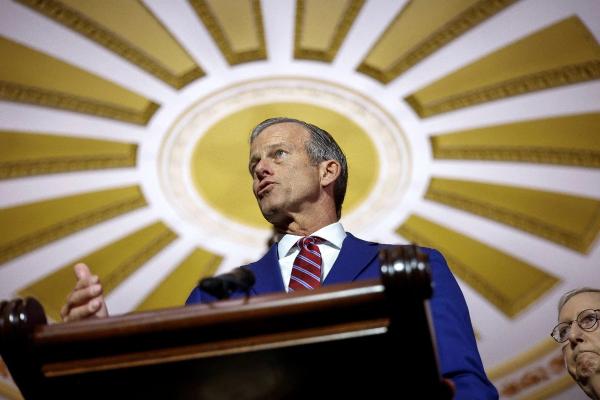
Sen. John Thune, Republican Party Whip
Democrats in the Senate have been dismissive about the news of the near weapons grade enrichment by the clerical regime. Asked if Iran’s ability to enrich uranium at 84% purity concerns him, Senator Bernie Sander said it is does but did not elaborate.
Other democratic senators in US Capitol hallways this week were not so eager to talk about it. ”I think we made a big mistake during the previous administration by pulling out of the nuclear deal with Iran,” said Senator Tom Carper (D-DE). “If we remained in that deal, we would not be in this situation.”
Former President Donald Trump pulled out of the Joint Comprehensive Plan of Action (JCPOA) almost five years ago and the some Democrats have been sticking to some version of Senator Carper’s sentiments ever since. It sounds like an excuse and it might be a good one for the domestic audience, but it’s not a strategy, nor is it a policy.
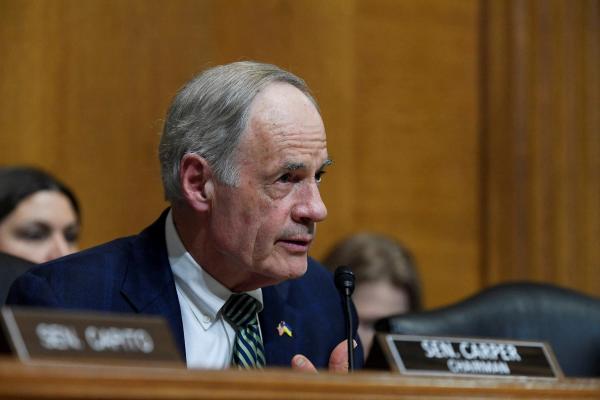
Sen. Tom Carper (D-DE)
The fact is that Iran’s gradual progress in enriching ever higher than what was agreed in the JCPOA has seriously worried the West and regional countries such as Israel and oil-producing Arab countries in Iran’s neighborhood..
South Korean President Yoon Suk-yeol surprised Americans in January when he said that if the US does not deploy back its tactical nukes to the peninsula, South Korea can “acquire its own nukes”.
Coincidentally, Saudi’s energy minister Prince Abuldaziz bin Salman on the same date told a group of attendees at a mining and industry conference in Riyadh that Saudi Arabia is planning to enrich its domestic stockpile of uranium to ensure that it will be able to “complete the entire fuel cycle.”
Enriching uranium to weapons grade is one thing, putting it in a warhead attached to a ballistic missile that is capable of delivering it to medium and long range targets in a matter of minutes, is another thing.
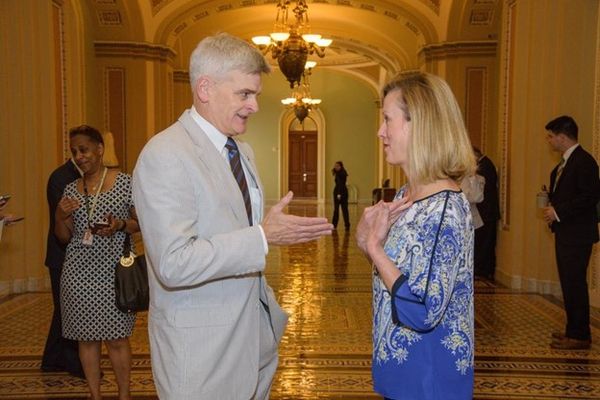
Senator Bill Cassidy (R-LA)
When asked if the US can realistically slow the Iranian ICBM delivery for nukes, Senator Bill Cassidy told Iran International: “I don’t know if they can stop the formation of a bomb, maybe the need is to stop them from being able to deliver it.”
Stopping Iran from its march towards weapons grade enrichment “exceeds what I know as to our capabilities,” he added.
That means the Republicans believe Iran’s nuclear program is anything but contained. If Iran moves to 90% enrichment capacity, then the million dollar question remains: who can stop the likes of Saudis and South Koreans from going down the same path?
https://www.iranintl.com/en/202303100562
Netanjahu hingegen sieht die rote Linie schon bei einem „threshold nuclear Iran“. Da scheinen US-und israelische Interessen doch noch auseinanderzuliegen. Ein regime change im Iran würde die Situation schlagartig ändern. Sei es Iran als Teil der Neuen Seidenstrasse, das just SCO- Mitglied wurde und zwei Tage danach die Unruhen ausbrachen, der rausgebrochen würde, sei es, dass ein freier Iran wieder prowestlich wäre, dass die Eskalation im Greater Middle East von Syrien, Libanon, Irak, Yemen mit all jenen Toten und Flüchtlingen über Nacht beendet würde, dass die nukleare Bedrohung Israels, Europas und vielleicht auch der USA sowie die Unterstützung des Terrorismus über Nacht weg wären. Doch momentan hört man nichts über weitere größere Massenproteste in Irans Städten. Die Frage, ob die Amnestie und Repression der Mullahs da ihre spalterische Wirkung entfaltete. Thomas von der Osten- Sacken meinte, dass spätestens zum Newrozfest die Proteste wieder losgingen, auch in Balutschistan, aber das sind mehr die kurdischen und balutschischen Minderheiten. Entscheidend wird sein, dass die mehrheitsiranische Gesellschaft in den iranisch dominierten Städten die Massenproteste nun voranbringt bis zu einem Regime change, wobei die Frage eben noch offen bleibt, wie sie der Repression oder einer direkte Machtübernahme durch die Iranischen Revolutionsgarden begegnen und diese paralysieren sollen. Auch wenn die Exilopposition jetzt einen bedeutenden Schritt mittels der Mahsa- Charta vollbracht hat, muss sich auch die im Iran vorherrschende Opposition einigen und den Kampf forcieren. Ansonsten bleibt diese eigentlich revolutionäre Bewegung von ihren Zielen, eben nur eine Rebellion mangels mehrheitsiranischer Massenunterstützung und Brechen der Macht der Revolutionsgarden. Ohne regime change wir auch die Frage sein, ob es dann zu einem nuklearen Wettrüsten der bisherigen Nichtnuklearstaaten und einer weitgehenden Auflösung des Nichtweiterbreitungsvertrag kommt, ja Südkorea und Saudiarabien schon unter Yong und MBS angekündigt haben, dass ie sich eigen Atomwaffen vorstellen können, Erdogan- Türkei und Al Sissi-Ägypten als nächstes folgen dürften, sowie Trump damals schon mittels des Iron Bridge-Programms Saudiarabien Nukleartechnologie liefern wollte, wie ein Kongressausschuss nachträglich aufdeckte nach dem Bericht eines Whistleblowers.
Kann Nonproliferation nur noch durch neue US-Kriege erzielt werden?
Kann ein nuklearer Iran abgeschreckt werden und ist er ein rationaler Akteur?
Will ein nuklearer Iran Israel vernichten?
US-Irankonflikt geht in die nächste Runde: Nukleartechnologie für Saudiarabien und Legitimierung eines Militärschlags gegen den Iran
Can a nuclear-armed Iran be deterred and is he a rational actor?
